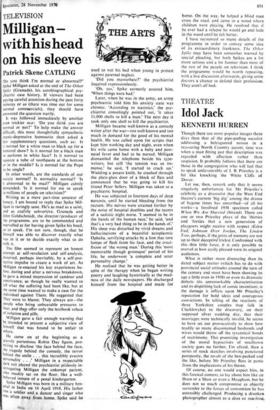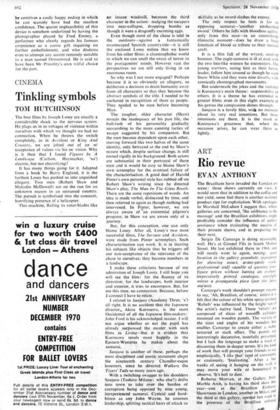THEATRE
Idol Jack
KENNETH HURREN
Though there are more popular images these days than that of the pipe-putting socialist addressing a beleaguered nation in a reassuring North Country accent, time was when a man fitting just that description was regarded with affection rather than suspicion. It probably follows that there are those in the congregation who will feel that to speak unfavourably of J. B. Priestley is a bit like knocking the White Cliffs of Dover.
Let me, then, remark only that it seems singularly unfortunate for Mr Priestlev's celebrity as a dramatist that the West End theatre's current 'big dig' among the drama of bygone times has unearthed—of all his works—a fossilised 1938 specimen called When We Are Married (Strand). There are one or two Priestley plays of the 'thirties and 'forties that a new generation of playgoers might receive with respect (Eden End, Johnson Over Jordan, The Linden Tree, perhaps, if the4nists of memory are not up to their deceptivrtricks). Confronted with this thin little farce, it is only possible to marvel at how easily pleased were its original audiences.
What is rather more dismaying than its dated subject matter (which has to do with provincial social attitudes around the turn of the century and must have been showing its age a little even in 1938) or even its dramatic defects (its unremarkable characterisation and its dispiriting lack of comic invention), is the damage it inflicts upon Mr Priestley's reputation for bold ideas and courageous convictions. In telling of the reactions of three Yorkshire couples (top folk in Clecklewyke) to the discovery, on their supposed silver wedding day, that their marriages were technically invalid, he seems to have set out provocatively to show how readily so many discontented husbands and wives would throw off the tyrannical bonds of matrimony. This promising investigation of the moral hypocrisies of smalltown society goes no further, I'm afraid, than a series of stock sketches involving punctured pomposity, the revolt of the hen-pecked and the like, before Mr Priestley flees in panic from the implications of his theme.
Of course, no one would expect him, in this farcical context, to lay about him like an Ibsen or a Shaw or even a Maugham, but he does not so much compromise as abjectly surrender to the forces of convention he has
ostensibly challenged. Producing a drunken photographer almost as a deus ex maehina,
he contrives a cosily happy ending in which he can scarcely have had the smallest confidence. The quaint implausibility of this device is somehow underlined by having the photographer played by Fred Emney, a performer who clearly regards his famous corpulence as a comic gift requiring no further embellishment, and who disdains even to attempt any accent remotely suitable to a man named Ormonroyd. He is said to have been Mr Priestley's own wilful choice for the part.















































 Previous page
Previous page